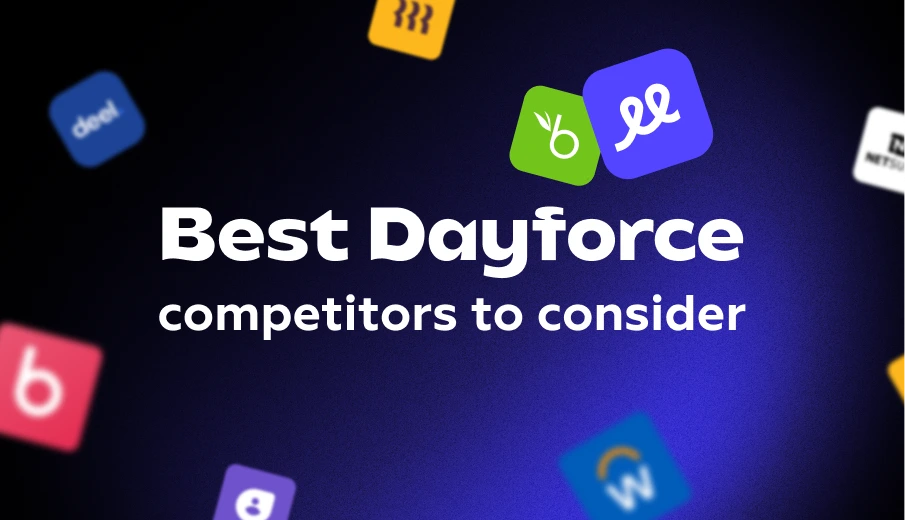Top Dayforce Competitors: Find the Best HR and Payroll Solutions for Your Business

In today’s fast-paced business environment, selecting the right Human Resources management software and payroll solution can significantly impact your team’s efficiency, compliance, and employee experience. While Ceridian Dayforce HCM (human capital management) is known for its comprehensive features and enterprise-grade infrastructure, it may not be the perfect fit for every organization—especially smaller or more agile teams looking for flexibility and ease of use.
In this article, I explore the top competitors to Dayforce that offer compelling alternatives. From agile European cloud software platforms like Sloneek to global enterprise tools like Workday, these solutions each bring unique strengths to the table. This app comparison helps you identify the right platform—whether you’re a small startup or a scaling business, understanding how these platforms compare will help you find the HR system that best matches your goals.
Overview of Dayforce and Its Market Position
Dayforce Ceridian HCM is a leading cloud-based suite for HR and payroll that integrates key workforce functions, including employee data management, into one centralized system. It combines human resources, payroll processing, time and attendance, and talent management with real-time analytics—making it a strong choice for organizations with complex operational needs.
Key differentiators include automated compliance updates, configurable workflows, and a robust mobile app that supports employee access on the go. Dayforce HCM particularly appeals to mid-sized to large organizations seeking full-suite workforce management across geographies and employee types.
That said, Dayforce isn’t the only solution on the market. Competing platforms like Sloneek, Workday, CharlieHR, Gusto, and Zenefits also deliver powerful tools—with varying strengths in automation, usability, regional compliance, and cost-effectiveness. Exploring these Dayforce alternatives can help businesses identify the platform that best aligns with their size, budget, and HR maturity.
Key Features of Dayforce
Dayforce offers several key features that enhance HR and payroll processes.
- Real-Time Analyticsand Reporting Dashboards: Dayforce provides real-time data analytics and intuitive dashboard and reporting features for informed decision-making.
- Integrated Payroll: Integrated payroll functionality simplifies salary calculations. This feature ensures compliance with tax regulations and payroll processing efficiently across multiple locations.
- Mobile Access: The mobile application allows employees to manage their information on the go. I can easily track time, access schedules, and submit requests directly from my device.
- Workforce Management: Comprehensive workforce management tools support workforce scheduling, time tracking, and leave management. I can streamline operations and reduce administrative burdens.
- Automated Compliance: Automated compliance updates ensure adherence to changing regulations. This feature minimizes risks associated with non-compliance and keeps operations aligned with legal requirements.
- Talent Management: Dayforce supports talent acquisition, applicant tracking, learning and development, and employee performance tracking. I can utilize performance management and training modules to foster employee growth.
- Customizable Workflows: Customizable workflows adapt the HR management software to specific organizational needs. I can tailor processes, automating tedious tasks and increasing efficiency.
These features strengthen Dayforce’s appeal, making it suitable for a variety of business sizes while addressing critical HR and payroll needs—and enhancing overall employee engagement through better communication, feedback, and recognition tools.
Top Dayforce competitors to consider
While Dayforce offers a robust suite for workforce management, several other platforms provide strong alternatives—particularly for businesses seeking greater flexibility, localized support, or simpler user experience. Below are five top competitors to Dayforce, each bringing a unique set of features to the table.
Sloneek
Sloneek is a European HR platform tailored for small to mid-sized businesses (10–250 employees), offering modular tools within a flexible cloud platform that covers onboarding, time tracking, absences, asset management, and document workflows. With a modern interface, local labor law compliance features, and multilingual support, Sloneek is ideal for teams that need lightweight but powerful HR automation —supported by a flexible automation builder that allows for workflow customization—along with transparent pricing and fast support.
Ideal for: European SMBs seeking customizable HR tools with local compliance.
Key features: Modular pricing, onboarding workflows, time tracking, digital document storage, absence analytics, integrations (e.g. Google, Slack, payroll systems).
Workday
Workday HCM provides a comprehensive human capital management (HCM) cloud-based platform designed for mid-sized to enterprise-level organizations. It combines HR, finance, planning, and analytics into one system. Its strength lies in real-time employee data reporting, advanced workforce management functionality—including Workday Workforce Management capabilities—strategic workforce planning, and dynamic labor costings for better financial oversight.
Ideal for: Larger organizations needing an all-in-one HCM and financial management platform.
Key features: Talent management, payroll, workforce scheduling, analytics, time tracking, financial planning, mobile-first design.
CharlieHR
CharlieHR focuses on simplicity and user-friendliness for startups and small teams. It offers core HR features like time off tracking, onboarding workflows, document storage, and performance reviews, centralized employee profiles for streamlined record keeping, and a basic Applicant Tracking System for growing teams. It’s ideal for companies that don’t need enterprise-level complexity but still want a centralized HR tool.
Ideal for: Startups and small businesses looking for an affordable, intuitive HR solution.
Key features: Time off tracking, lightweight onboarding, employee records, performance reviews, simple compliance tracking.
Gusto
Gusto is an all-in-one payroll automation software and HR management software designed for small businesses in the United States. It automates payroll, handles tax filings, manages benefits, and supports basic HR functions. Gusto is known for its approachable interface and helpful customer service, making it a favorite for teams without dedicated HR staff.
Ideal for: Small U.S. companies seeking payroll-focused HR automation.
Key features: Automated payroll, benefits management, onboarding, employee self-service, contractor payments.
Zenefits
Zenefits offers a flexible platform for small to mid-sized companies, emphasizing benefits administration and compliance. It integrates with multiple payroll providers, supports onboarding, time tracking, and employee self-service, and is especially useful for businesses navigating U.S. HR regulations.
Ideal for: SMBs in need of integrated HR and benefits solutions, with tools that help boost employee engagement and satisfaction.
Key features: Benefits Management, onboarding, time tracking, compliance support, app integrations.
Comparing Pricing and Value
Pricing varies across Dayforce’s top competitors, reflecting differences in platform capabilities, market focus, and level of support. While Dayforce HCM typically targets medium to enterprise businesseswith a customized pricing model, specific pricing details are only available upon request and often depend on employee size and selected modules.
Platform Pricing Comparison
|
Platform |
Pricing Approach |
Key Features |
|---|---|---|
|
Dayforce |
Custom enterprise pricing |
HRIS, payroll, workforce management, compliance |
|
Sloneek |
Modular transparent pricing (from €2/user/month) |
Time tracking, digital documents, onboarding, European compliance |
|
Workday |
Custom pricing (~$50–$100/user/month) |
HCM, finance integration, analytics, enterprise scalability |
|
CharlieHR |
Freemium + paid plans (~£4–6/user/month) |
Time off, onboarding, reviews, SME-friendly dashboard |
|
Gusto |
Base fee $39 + $6/user/month |
Payroll, benefits, onboarding, employee self-service |
|
Zenefits |
Flat rate $10/user/month + add-ons |
Benefits, onboarding, compliance, third-party payroll integrations |
User Experience and Support Across Competitors
User experience and support are key in determining how easily your HR platform integrates into daily workflows. Let’s take a closer look at how Dayforce’s competitors perform in terms of usability and customer assistance.
Sloneek
Sloneek’s interface is clean and modern, offering intuitive dashboards and configurable workflows for small and medium-sized businesses. It supports local compliance for European markets and includes modules like digital file management, asset tracking, and time-off analytics.
Support model: Multilingual onboarding, knowledge base, live chat, fast-response email support tailored for European clients.
Workday
Workday HCM balances depth and usability with a highly customizable interface. While it can take longer to implement, once configured, it provides detailed analytics and planning tools across HR and finance.
Support model: Enterprise-level support with 24/7 availability, dedicated reps, and extensive documentation and user community.
CharlieHR
CharlieHR focuses on simplicity. The platform is built for non-HR users, making daily tasks like requesting time off or reviewing documents frictionless.
Support model: Accessible live chat, onboarding tutorials, and a searchable help center ideal for small teams.
Gusto
Gusto delivers a friendly, modern interface with clear navigation, especially around payroll and onboarding. It’s well-loved for its approachable design, even for users unfamiliar with HR systems.
Support model: Live chat and phone support, onboarding guidance, and proactive customer success outreach.
Zenefits
Zenefits offers a clean dashboard optimized for HR generalists. The interface makes benefit management and onboarding tasks fast and efficient.
Support model: Online help center, email and chat support, with higher-tier plans offering access to HR advisors.
Which Dayforce competitor is right for your business?
Selecting the right alternative to Dayforce HCM depends on your company’s unique needs. Key factors include team size, regional requirements, budget, and the specific HR functionalities you’re prioritizing—like onboarding, payroll, or compliance support.
- Sloneek: Sloneek is the best fit for small to mid-sized European businesses seeking flexible modular tools and localized compliance support. Its clean interface, transparent pricing, and fast support make it a top choice for teams needing efficient automation without enterprise complexity.
- Workday: Workday HCM is ideal for medium to large enterprises that need a unified platform for HR, finance, and planning. Its scalable infrastructure, advanced dashboard and reporting, and real-time analytics make it perfect for organizations with complex needs and multiple departments.
- CharlieHR: CharlieHR is best suited for startups and small businesses looking for simplicity and affordability. Its intuitive platform covers essentials like time-off tracking, onboarding, and lightweight performance management, without overwhelming users with unnecessary features.
- Gusto: Gusto is a great option for U.S.-based small businesses seeking a payroll-first solution with integrated HR features. It offers a user-friendly experience, straightforward pricing, and reliable support—perfect for companies with limited in-house HR expertise.
- Zenefits: Zenefits is designed for small to mid-sized teams that need a broad set of HR tools with built-in compliance and benefits administration. Its seamless user experience and affordable pricing make it a compelling option for fast-growing teams.
Assessing these competitors involves looking beyond pricing alone—consider user experience, support models, regional fit, and how each platform scales with your business. Matching your operational goals with the right tool ensures your HR processes stay smooth and effective.
Conclusion
Choosing the right HR and payroll platform is a strategic decision that directly impacts your company’s efficiency and employee experience. While Dayforce HCM provides an all-in-one solution for larger or complex organizations, it may not be the best fit for every team.
- Sloneek offers flexible pricing, modular tools, and European compliance, making it ideal for small to mid-sized businesses.
- Workday brings robust enterprise functionality with integrated analytics and advanced talent management capabilities.
- CharlieHR keeps things simple and affordable for startups.
- Gusto makes payroll effortless with a strong focus on user experience.
- Zenefits balances affordability and functionality for growing U.S. companies.
To make the best choice, align your selection with your team size, compliance needs, technical capacity, and future growth. Take advantage of free demos, test support responsiveness, and prioritize tools that not only work today but will continue supporting you as your organization evolves.
As HR technology evolves, some platforms are beginning to incorporate generative AI capabilities—such as automated policy generation, job description writing, or even predictive analytics for hiring. While these features are still emerging, keeping an eye on their development can give your organization a competitive edge in future-proofing your HR strategy.




